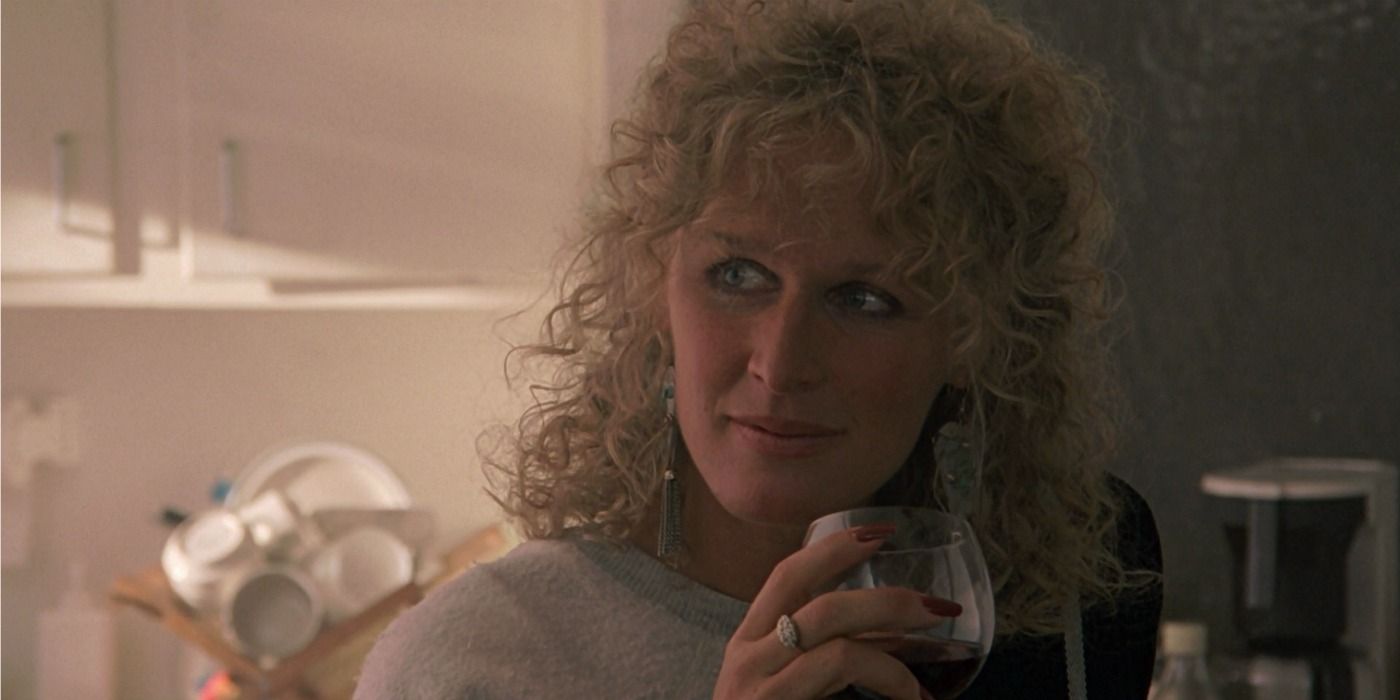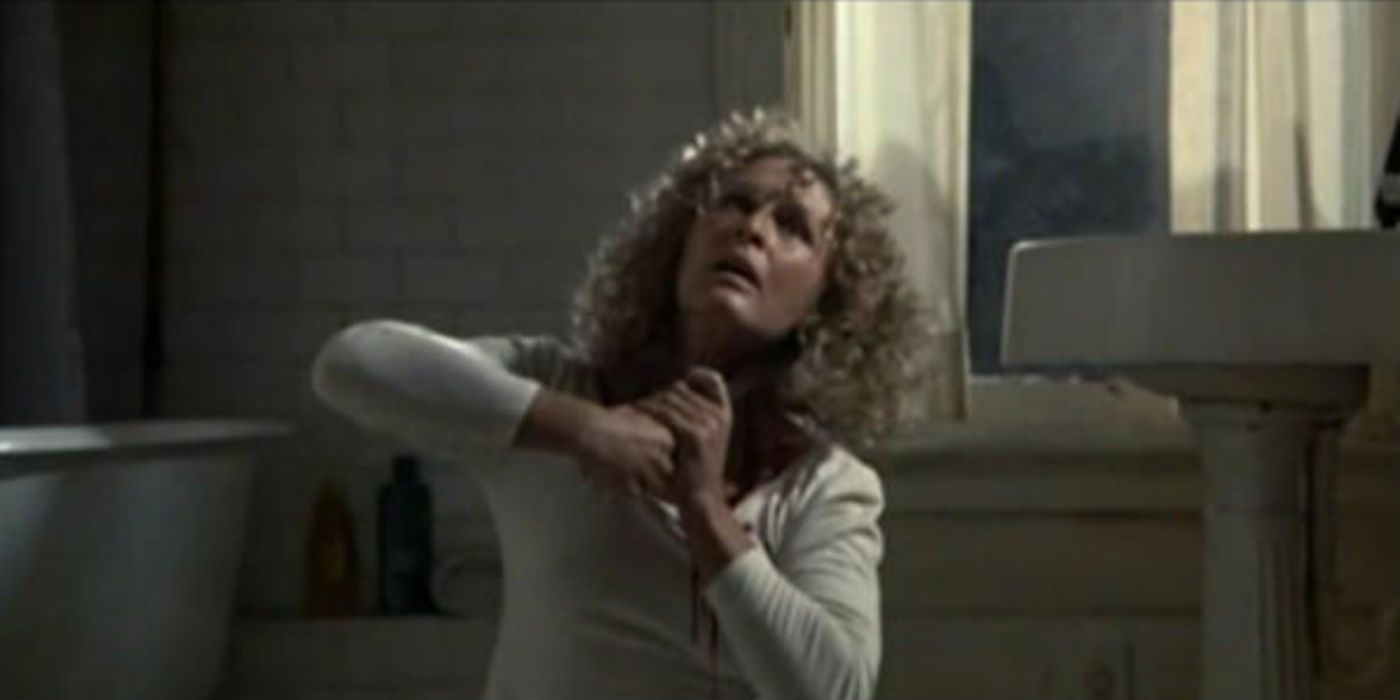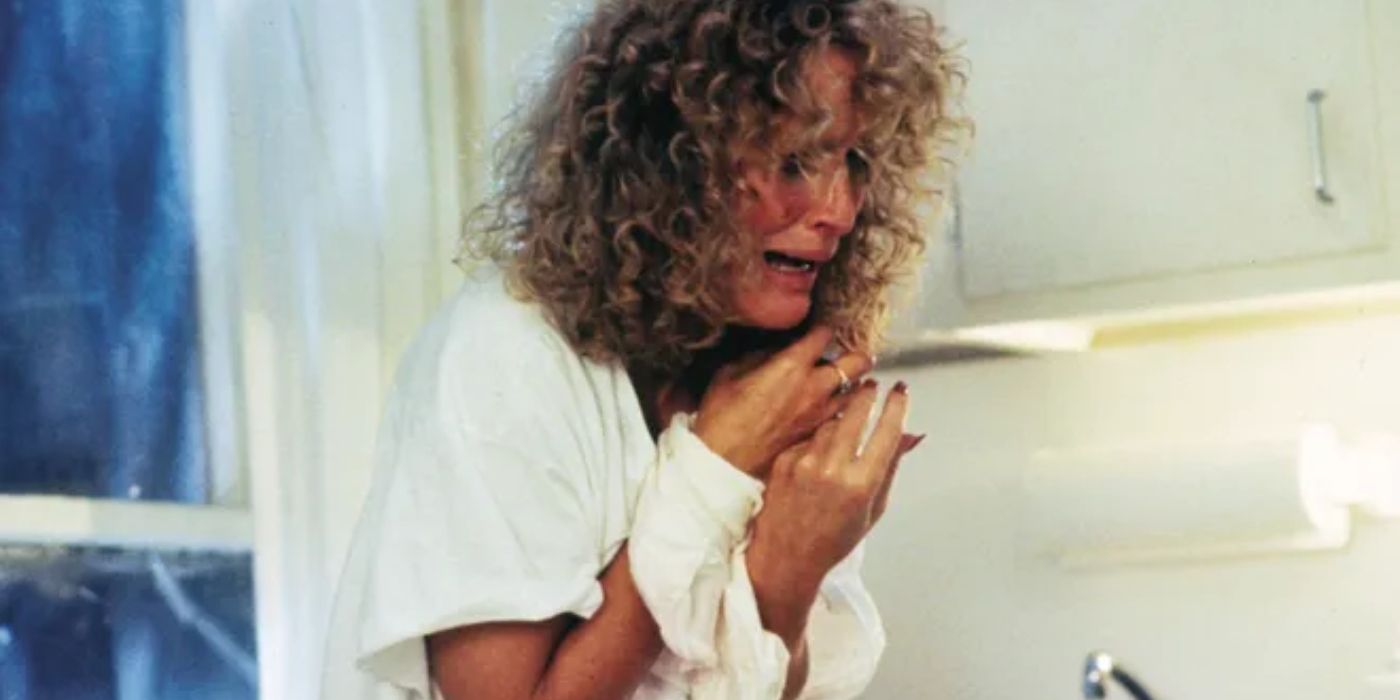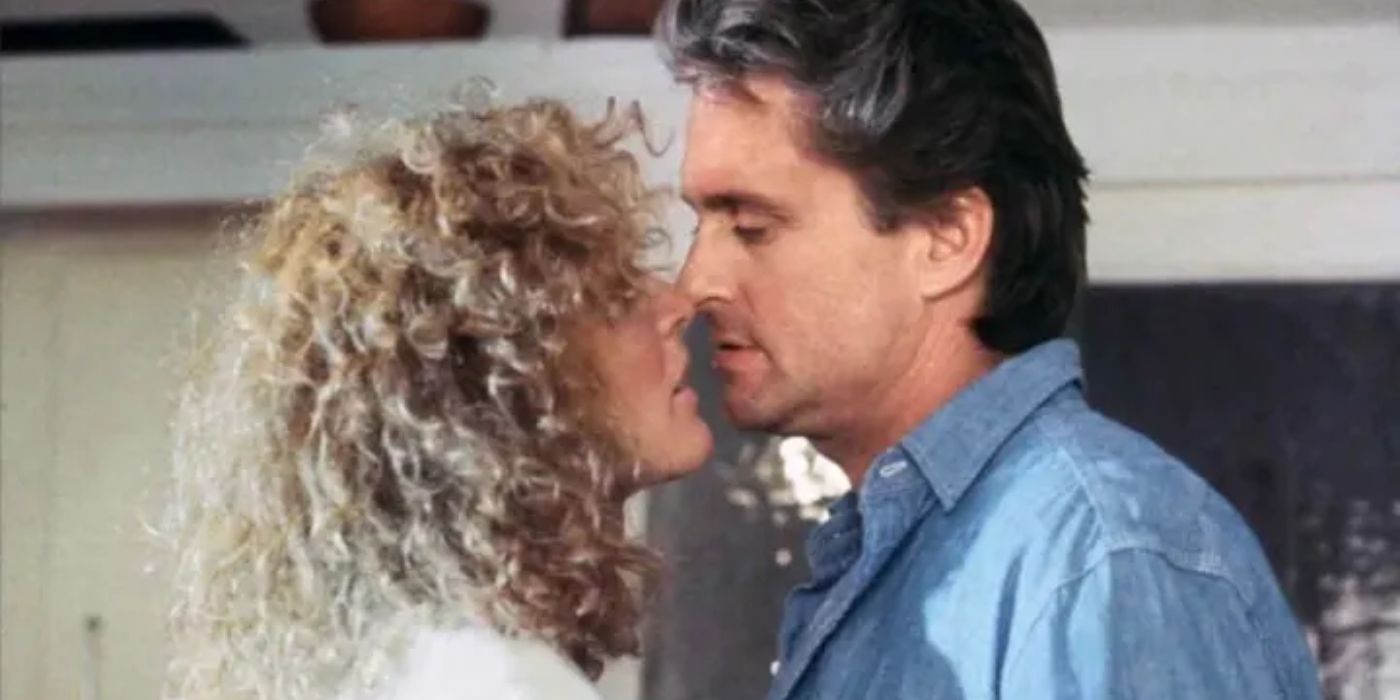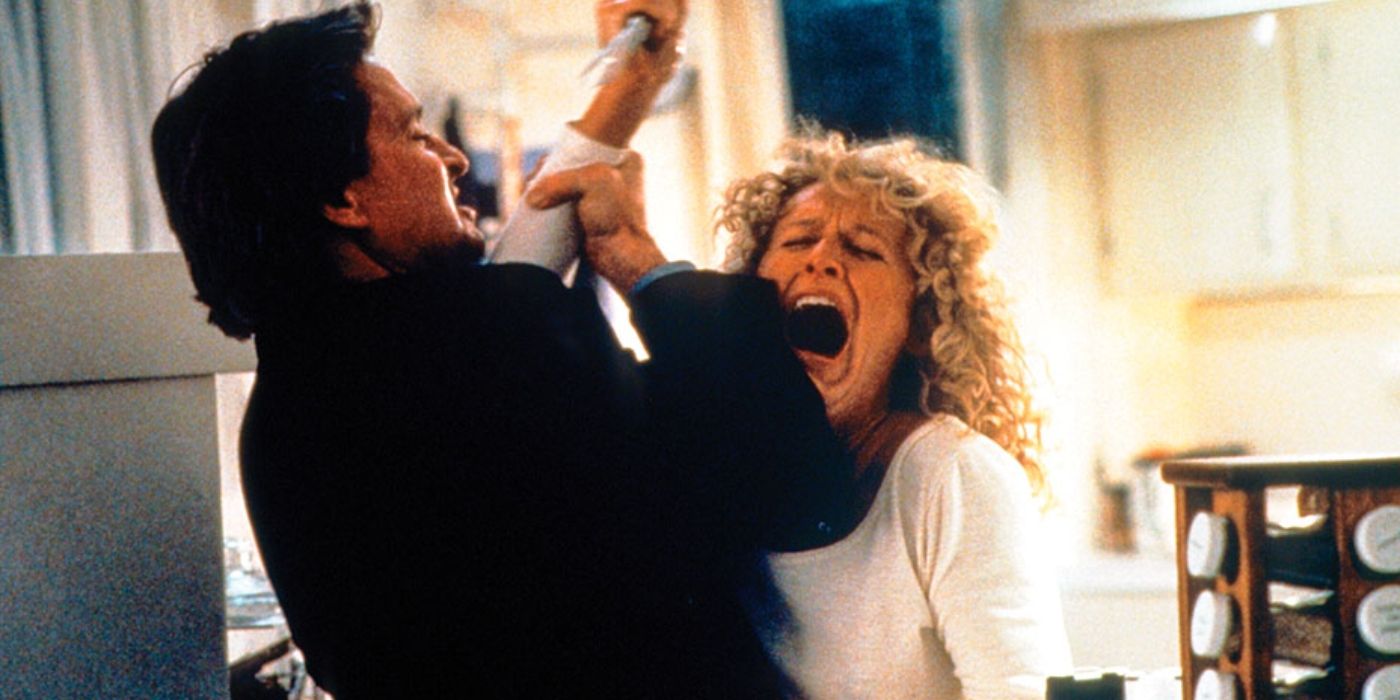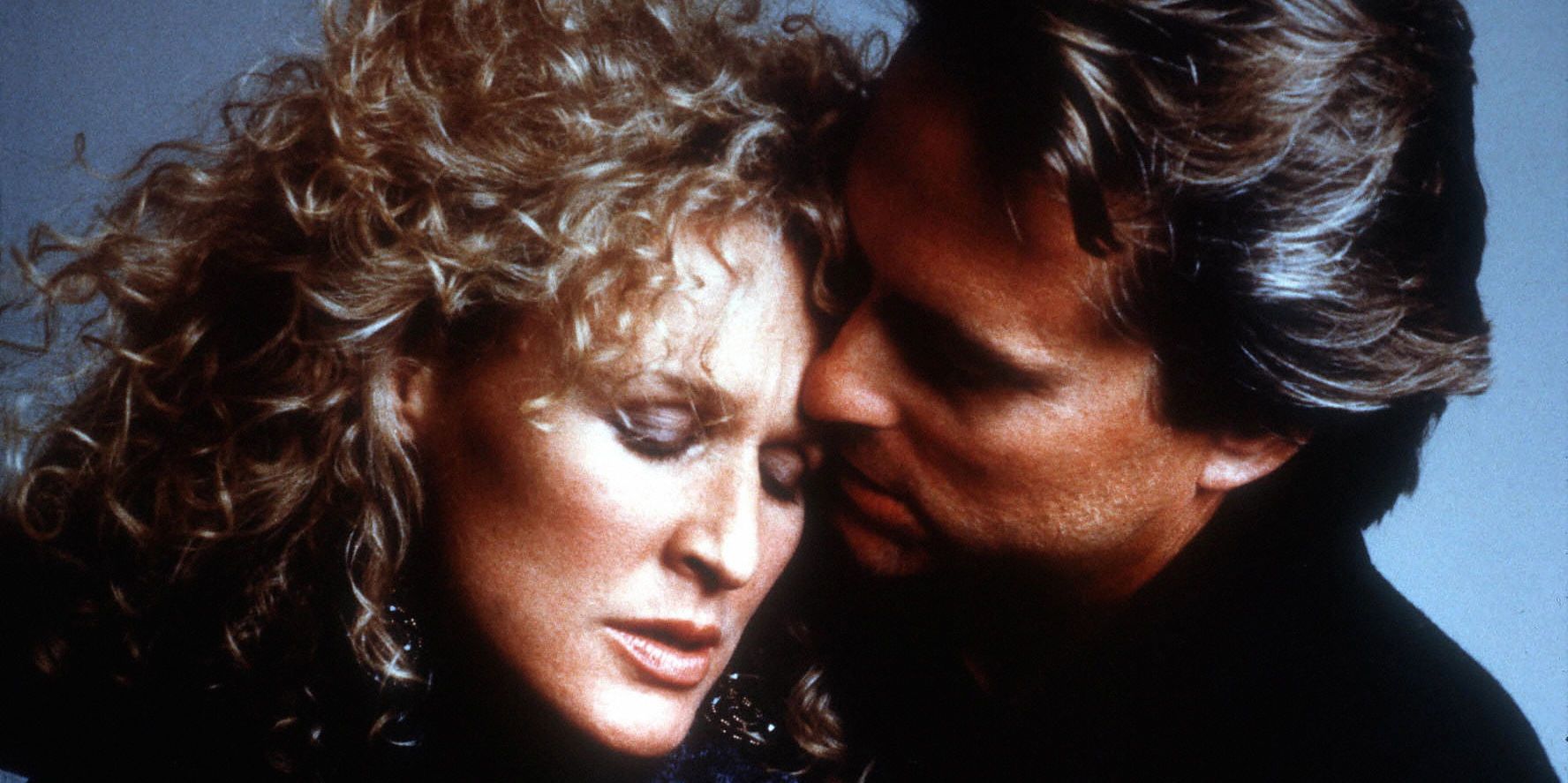Content Warning: This article contains discussions of mental illness and suicide.
The 1987 thriller Fatal Attraction ending explained what happened when an affair went wrong, and its dark ending remains impactful. Lawyer and married father Dan Gallagher (Michael Douglas) sleeps with editor Alex Forrest (Glenn Close) and is stunned when she becomes obsessed with him. As Dan’s wife, Beth (Anne Archer), learns the truth, Alex becomes determined to ruin his family life. Fatal Attraction was nominated for six Oscars, including Best Actress, Best Director, and Best Picture, and there are many unforgettable scenes, including when Alex boils Dan and Beth’s daughter, Ellen’s (Ellen Hamilton Latzen) pet rabbit to prove that she is not going away.
Her portrayal of Alex is one of Glenn Close’s best performances, and Fatal Attraction has a dark and memorable ending, as Alex and Dan’s relationship is given a proper conclusion while what happens to his and Beth’s marriage is also explained. The movie once had a different conclusion, but audiences who attended early test screenings were unhappy with the way that the story wrapped up, so a second ending was written and filmed. It’s interesting to compare these endings as they are completely different, although one makes more sense for the story.
The Fatal Attraction Ending Explained
The released version of the Fatal Attraction ending explained that Dan fought back and almost killed Alex by strangling her in her apartment. He goes home to Beth, as they appear to be on a better path, and all seems well. Then, Beth is at home about to take a bath when Alex appears, holding a knife. This adds to what makes Fatal Attraction among the best psychological thriller movies because Beth, Dan, and Ellen never feel safe. At that moment, Dan rushes in and seems to drown Alex in the bathtub. However, there is one more jump scare as Alex emerges from the water, at which point she is shot to death by Beth.
Beth being the one who kills Alex in the Fatal Attraction ending is surprising since, if any character would murder her, Dan would be the obvious choice given that he attacked Alex in the previous scene at her apartment. This is a significant moment for Beth, who has been devastated by her husband’s infidelity and who is shocked into action to protect her family. She makes the choice to use her husband’s gun in a split second, and it changes everything.
Like in many thrillers about husbands and wives, Beth is not developed as a character much before this moment. She represents the happy family life that Dan led prior to meeting Alex, although there are questions about why he would be unfaithful if that were true. The fact that Beth is front and center and integral to the Fatal Attraction ending is important, as the conclusion of her arc allows Fatal Attraction to explore how a family puts the pieces of their life back together. In the last scene, the married couple hugs, suggesting that they will stay together despite the ordeal they have been through.
The ending is not entirely unexpected given the violence in the movie, with Alex boiling Ellen’s pet, kidnapping Ellen from school, and throwing acid onto Dan’s car. As is typical of the best erotic thrillers, it is always clear that there will be a final showdown between the leads, in this case, Dan and the woman he has been unfaithful with, and it appears that one or both of them will die. Since Alex wants to be with Dan, and he doesn’t want to leave his wife, the Fatal Attraction ending explained it must be a dramatic moment, with Alex’s death being the result.
Was Alex Really Pregnant?
After Alex and Dan sleep together, she shares that she is pregnant, and at first, it appears that she could be lying. A fake pregnancy is one of the most common psychological thriller tropes, as when someone says that they are expecting, it would be offensive to accuse them of not telling the truth. However, it makes sense that Dan isn’t certain whether he should believe Alex, as she’s a stalker capable of manipulation. While the validity of this character’s situation is one of the biggest questions about Fatal Attraction, it appears that she is actually pregnant, as Dan phones her doctor and appears to be satisfied with the answer.
While the movie would likely still be powerful without Alex’s pregnancy, this storyline does add a layer of seriousness and tragedy to the story. When Alex tells Dan that he should want to take care of their baby, she is still attempting to emotionally manipulate him into leaving Beth and starting a family with her. But there is nuance here. Alex is looking for love, connection, and family, and while she is shown to be a harsh and violent person who will do anything to get what she wants, her desire for a serious partner is understandable.
Why Fatal Attraction’s Original Ending Was Changed
Test audiences didn’t like the original ending of Fatal Attraction, which featured Alex taking her own life and then framing Dan for her murder. Alex ensured that Dan’s fingerprints were on the knife that she used, which allowed the police to charge him for the crime. After Dan was arrested, Beth listened to a tape where Alex talked about her scheme, which meant that Dan wouldn’t end up in prison after all. This original Fatal Attraction ending didn’t land well with viewers. The movie’s director, Adrian Lyne, told Yahoo! Movies, “The last 20 minutes of the movie fell flat.”
Glenn Close Didn’t Like Fatal Attraction’s Ending
Glenn Close didn’t want to shoot the new version because that Fatal Attraction ending that failed test screenings was a nod to the opera Madama Butterfly, which Alex loves. Lyne admitted, “We were all reluctant initially because there was something nice about the idea of the ending reflecting the opera.” Close also didn’t like the new ending because it made Alex a villain. For Vanity Fair, she explained, “I felt that I was betraying the character that I believed in.” However, she accepted the ending because it gave audiences “catharsis.” She acknowledged to People, “I don’t think it would have been the huge hit that it became without the ending.”
Glenn Close has also said that she didn’t like how Fatal Attraction ended up making Alex look. It wasn’t just the ending that made her a villain, but the entire way the movie framed her character as bad and Michael Douglas’ cheater as good. She spent a lot of time studying mental illness and added a lot of what she learned into her character. Close wanted to show that Alex was fighting her own fragile mental state and when Dan rejected her, she broke. In her eyes, Alex was never the villain, but a victim of Dan’s manipulations.
Which Fatal Attraction Ending Is Better
The new Fatal Attraction ending is better than the original because Alex taking her own life could be viewed as problematic. Fatal Attraction features a main character who is painted as “crazy,” which is an example of the stereotypical portrayal of mental health in popular culture. While both Fatal Attraction endings see Dan and Beth remaining married and raising their daughter, with Alex dying, Dan and Alex’s fates are very different in each version. If Alex died the way that she did in the original ending, this would drive home that the movie doesn’t treat her in a compassionate manner.
Glenn Close shared in the same People video interview that she spoke to psychologists to understand the character, and they felt that Alex had been abused by her family and this led to her mental health struggles. The reason why Fatal Attraction is more well-known than Glenn Close’s more under-the-radar movies is how bold Alex’s characterization is. The actor also explained that a professor diagnosed Alex with borderline personality disorder, which seems to be a common sentiment, and people told Close her character makes those “suffering with borderline personality look like monsters” (via CNN). Neither ending allows Alex to find support or care.
When it comes to the alternate ending of Alex framing Dan for her murder, that was the ending that the new remake of Fatal Attraction went with. In the new series, Dan is in prison and then the show goes into the flashback scenes that show what really happened as he tries to clear his name. New Alex actor Lizzy Caplan said the new version of Fatal Attraction could never do the ending the original movie left off with.
“I don’t think that we’ve arrived at any finish line in terms of everything that’s happened with #MeToo and what that set in motion. But the idea that you could never make the 1980s version of this now, shows some degree of progress.”
The Real Meaning Of Fatal Attraction’s Ending
The ending of Fatal Attraction suggests that any happy marriage or peaceful family can be threatened at any moment by a stranger, which is definitely an intense message. Because Alex is shown to be “unhinged,” and she is violent toward both humans and animals, she isn’t meant to be a character who anyone can empathize with. However, the movie serves as an example of an unfair and harsh picture of someone suffering from a mental health issue, as Alex’s backstory isn’t explained and her arc doesn’t have a hopeful conclusion.
Movies like Fatal Attraction often have shocking endings, but since Alex is killed, in both versions, this conclusion suggests that it’s the only way for her story to be wrapped up. This is a shame because if the character was able to find help and be supported, her life might have turned out differently.
How The Fatal Attraction 1987 Director Adrian Lyne Explains The Movie (And Ending Changes)
Director Adrian Lyne made his name on erotic thrillers in the 1980s, and Fatal Attraction might be his most famous. When it comes to the Fatal Attraction ending explained, Lyne said he stands by his decision to have Beth kill Alex, rather than Alex frame Dan for her death. “The other ending felt flat — it’s as simple as that,” Lyne said (via Yahoo Entertainment). He went on to say that it never worked dramatically, and he decided, along with his producers, that a different ending was needed to pay off the story. While actor Glenn Close and the new filmmakers of the remake seemed to like the original ending better, Lyne sticks with his choice.
“I remember talking to Glenn about the end, because she was very upset. We were all reluctant initially because there was something nice about the idea of the ending reflecting the opera. Somebody said that the only innocent party in the movie is Beth, so it had a certain logic that [Alex’s death] would come from her.”
However, even with Beth getting the action hero moment in a movie all about her husband’s infidelity, Lyne still gravitates to Alex when looking back on his movie. With Michael Douglas and Anne Archer both solid, it was Glenn Close’s performance that really draws Lyne in when re-watching Fatal Attraction (via Fansided). He specifically points to the scene where Alex shows up and asks Dan to go to the opera with her and when he says it’s over, she has a look of heartbreak on her face. “That always knocks my socks off, really, when I see it because it wasn’t a close up, but a wide shot. It was just a heartbreaker. Every time I see it I think, “F***, Glenn was good.“
This story originally appeared on Screenrant


